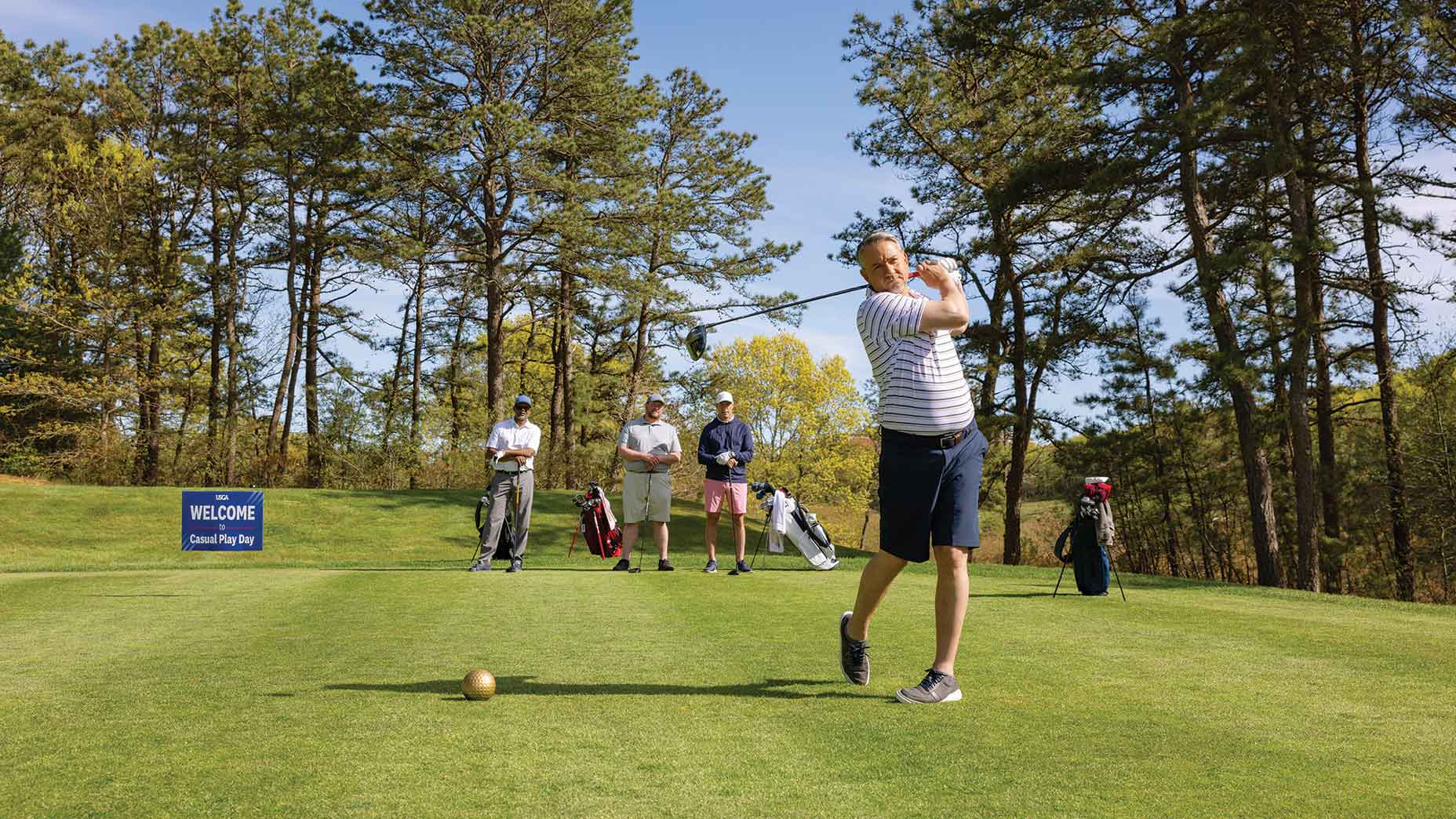Why flexible golfers have more opportunities to compete than ever before

Group photo at the Golf Association of Philadelphia (GAP) sponsored swing clinic at Honey Brook (Pa.) Golf Club.
USGA/Jason E. Miczek
This content was originally published in Golf Journal, a quarterly publication exclusively for USGA Members. To be among the first to receive Golf Journal and learn how to ensure a strong future for the game, become a USGA Member today!
Growing up, Anna Kittelson had two main passions: golf and helping people with disabilities. His first love began at the age of 12, when Kittelson’s grandfather invited him to a driving range and discovered his natural talent for the sport.
His second love began at the same time, when he volunteered for the Special Olympics. Later, when he was a high school student, Kittelson participated in a class called Peer Help and Leadership, which enabled him to help his classmates with disabilities, and he volunteered at a camp for people with disabilities.
During his senior year of college, Kittelson worked as a caregiver for a child with autism — he even spent time hitting balls in the yard with him, echoing his introduction to the game with his grandfather. With these two passions intertwined, Kittelson sought some way to combine them in future work.
After playing golf at Midwestern State University and the University of Delaware and earning a BA in exercise science, Kittelson realized the medical field wasn’t a good fit. He decided to take a job as a shop assistant at Bidermann Golf Club in Wilmington, Del., an opportunity that would change his life.
While at Bidermann, Kittelson began searching for opportunities that would fulfill his desire to help others, especially people with disabilities. Talking about his hobbies with Anthony Malizia, Bidermann’s head golfer, he talked about the USGA’s Adaptive Open Championship.
Researching the event, Kittelson knew he had to get involved in some way. Luckily for her, Malizia had recently met Mario Machi, the assistant executive director of the Golf Association of Philadelphia (GAP), who was interested in adding adaptive golf – enabling people with cognitive, health, physical and sensory challenges to participate in the game. by using modified tools and rules – as a contribution to the new system. Shortly after meeting Machi, Kittelson found PJ Boatwright Jr. Internship, which enabled him to serve GAP as a flexible golf student.
Midway through his year-long internship, he was offered a full-time role as GAP’s manager of flexible golf. Since taking office this January, Kittelson has focused on serving the region’s approximately 350 dynamic golfers.
“Golf is a game that everyone can play together, whether they have a disability or not,” said Kittelson. “We want to introduce this game to this underrepresented community.”
To do so, GAP is preparing to host a tournament on Oct. 14-15 which will have a format similar to the US Adaptive Open. Hosted at Lookoway Golf Club and Doylestown Country Club in Bucks County, Pa., the tournament will expand opportunities for those in the dynamic golf community.
GAP works to introduce golf to people with disabilities, but it’s another way to expand the participant base. This year, it is hosting more than 14 “Unlimited Clinics” – designed to prove that anyone can play, the clinics are 90 minutes and taught by PGA professionals. For 45 minutes, flexible young golfers learn on the range, hitting shots with various clubs, followed by another 45 minutes of chipping and putting. Each clinic is tailored to the goals and skill levels of the attendees.
“It’s all about building a dynamic golf community and helping people make new friends. “Hopefully they’ll catch up on golf and play in dynamic tournaments,” Kittelson said. “Above all else, we want to remove barriers to entry and promote an inclusive, accessible sport.”
With these goals in mind, Kittelson hired Tyler Cashman as an intern for the summer of 2024. A visually impaired adaptive golfer who has played in the past two US Adaptive Opens, Cashman met Kittelson at the Eastern Regional, a handicap and adaptive golf tournament.
“The impact of the US Adaptive Open on adaptive golf has been tremendous, as the number of adaptive golfers has grown significantly since its inception,” said Cashman. “By giving versatile golfers the opportunity to play at a high level, it really shines a light on what we can do. I hope it continues to dispel any stereotypes that people with disabilities may have on the golf course.”
Breaking stereotypes – good
The USGA first became involved with golf swings more than 30 years ago. In 1991, it introduced a grant program to provide financial assistance to non-profit organizations dedicated to helping golfers with disabilities, and in 1997, it introduced the “Amended Rules of Golf for Handicapped Players.”
The USGA continued to expand its involvement in two main ways. In 2019, together with The R&A, the organizations began to administer the World Ranking for Golfers With Disabilities (WR4GD) through the World Amateur Golf Ranking (WAGR). Two years earlier, in 2017, it had committed to changing golf swings forever.
That year, during its Annual Meeting, the USGA pledged to create a new championship for the dynamic golf community. Although Covid-19 delayed its launch, the USGA’s promise came true when the US Adaptive Open began in July 2022 at Pinehurst Resort & Country Club’s Course No. 6.
Since the first and subsequent installments at Pinehurst in 2023 and Sand Creek Station in Kansas in 2024, variable golf’s popularity and profile have grown exponentially. According to Stephanie Parel, USGA’s US Adaptive Open championship director, approximately 700 Americans are certified adaptive golfers. As recently as 2018, that number stood at 2.
During this time, the number of WR4GD Counting Events in the US increased from about 12 to over 30. Many of these events are sponsored or run by the USGA’s network of Allied Golf Associations (AGAs) across the country.
“When the USGA started the US Adaptive Open, one AGA had an adaptive tournament,” Parel said. “By the end of this year, there will be eight – with more on the way in 2025.”
As he reflects on the past two years, Kittelson believes the impact of the US Adaptive Open on a local level is undeniable, as it leads people like him to become passionate about the idea and its potential.
“There are a lot of people with disabilities who never thought about golf before, but now they’re getting involved,” she said. “And they play with people without disabilities, which is good for the whole golf community, as people come from all walks of life and enjoy the game together.”
Parel agrees, adding that not only has the game become “more welcoming, accessible and inclusive,” but golf facilities, too, are making sure that everyone who wants to play can feel free to do so.
“The stories of the golfers who changed were incredibly inspiring and motivating,” said Parel. “They remind us – the golf community – of everything we love about the game: friendship, integrity, perseverance and playing for real joy.”
Parel believes that, along with the US Adaptive Open golfers’ obvious interest in camaraderie and camaraderie, they are some of the most competitive golfers he has met.
“Don’t let their smooth personality fool you; they are fierce competitors,” he said.
In fact, Parel has found that their competition has increased, especially as more flexible golfers join the tournament, leading to lower scores with each passing year.
“Once we’re off the course, we’re a big community,” Cashman said. “But when we’re on the course, there’s a very competitive atmosphere.”
To wit: at the 2023 US Adaptive Open, England’s Kipp Popert won the men’s title by one stroke with a 54-hole total of 2-under-par 214.
Matt Vanderpool, CEO of the Georgia State Golf Association (GSGA), has seen this strong interest in winning firsthand. Since 2019, the GSGA has hosted the Georgia Adaptive Open, which some adaptive golfers consider one of the top five adaptive tournaments in the world.
After hosting the event at the nine-hole Bobby Jones Golf Course in Atlanta for four years, this June the GSGA is hosting it at the Retreat Course, an 18-hole facility at Georgia’s Sea Island Resort. Its field size was increased from 36 to 60, and 88 golfers had signed up for it in February, further proving golf’s ever-increasing popularity.
“I believe the profile of swing golf will continue to grow exponentially over the next five years,” said Vanderpool. “The US Adaptive Open has brought more attention to adaptive golf, and with more AGAs around the country adding adaptive tournaments and programs, there will be more opportunities for adaptive golfers to learn and enjoy the game locally.
Parel also noted that many AGAs engage in low-quality programs, leading to new golfers. In particular, he thinks the AGAs will promote a more flexible golf course for juniors and women moving forward.
“Conversion golf is blowing up in the right place,” he said. “The interest and support from the traditional golf community, foundations and sponsors has been tremendous.”
As more AGAs prepare to launch tournaments, Kittelson is focused on doing what he can to help promote community competition — the dynamic community golf is known for.
“We all have to work together to make sure we’re doing everything we can to develop every dynamic golfer,” Kittelson concluded. “There are a lot of talented athletes who are participating. Each AGA must do everything they can to provide them with the best experience possible, while we all continue to build an inclusive, fun and competitive environment.”
Source link







